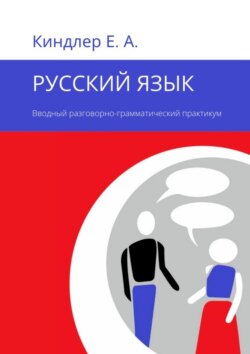Читать книгу Русский язык. Вводный разговорно-грамматический практикум - Евгений Александрович Рекин, Степан Петрович Мамонтов, Евгений Александрович Ларин - Страница 5
Урок 3 Личные, указательные и притяжательные местоимения Члены семьи, профессии. Lesson 3. Personal, demonstrative and possessive pronouns. Family members, professions
ОглавлениеAs you know, there are six cases in Russian: nominative, genitive, dative, accusative, instrumental and prepositional. Pronouns also vary in cases. In this tutorial, we’ll talk first about nominative, dative, accusative, and then about genitive. Consider for example the pronouns I. I’m nominative (who), me accusative (whom), me dative (to whom). Compare the following sentences in English and Russian.
For subject is used the nominative case. The accusative is used if somebody or something is not subject but object. The principal meaning of the accusative is to designate a person or thing to whom or which and action is being done. The dative case is used in Russian for the indirect object of a sentence. The indirect object is normally the person who receives the direct object.
We have already said that the expression у меня есть means I have. This is a preposition, after which the genitive is used. Personal pronouns in the genitive case except он, она, оно have the same forms as in the accusative case. The primary meaning of the Russian genitive case is to show possession.
Упражнение 1. What family members do you have
Члены семьи (Family members)
Grandparents3
У меня нет… – I do not have…4
Дедушки
Бабушки
Родителей
Папы
Мамы
Детей
Сына (Брата)
Дочери (Сестры)
Внуков
Внука
Внучки
Родственников
Мужа
Жены
Дяди
Тёти
Племянника
Племянницы
Двоюродного брата
Двоюродной сестры
Упражнение 2. Tell about your family using the table.
In the Russian language there are possessive pronouns. Possessive pronouns are a group of words indicating a sign of an object by its affiliation (something to someone) and answering questions whose (чей). They can be masculine, feminine, neuter or plural. The gender and number of possessive pronouns is determined by the noun in front of which they stand. For example: мой папа (m), моя мама (f), моё упражнение (n), мои родители (pl).
Упражнение 3. Indicate the possessive pronoun according to the gender and number of the noun.
For example,
мой, твой, его, её, наш, ваш папа (m)
моя, твоя, его, её, наша, ваша мама (f)
Члены семьи – Family members
Учёба – Study
Еда и напитки – Food and drink
Профессия (profession)
Compare these words. You can see they’re alike. There are many borrowed and international words in Russian. English words with the ending «sion» are used in Russian with the ending «сия».
Nouns with the ending «tion» have the endings «ция».
Of course, the meanings of such words in English and in Russian are not always identical.
Complection – color of skin.
Комплекция – body type.
Nevertheless, you already know several tens of thousands of such words, applying this scheme.
Кто ты (Вы, он, она) по профессии?
Я учитель (по профессии).
For some professions one word is used in Russian. For others different words are used depending on the gender.
!Учитель is used for the teacher at school, преподаватель is used for the teacher at university.
Упражнение 4. Make dialogs like these
– Кто твои родители по профессии?
– Мой папа по профессии инженер, а мама учительница
– У тебя есть братья и сёстры?
– У меня есть только брат.
– А кто он по профессии?
– Мой брат бизнесмен.
!Этот/ тот – this/that
Упражнение 6. Indicate the demonstrative pronouns according to the gender and number of the noun.
For example, этот, тот (папа)
эта, та (мама)
3
There are not a special word for «grandparents» in Russian.
4
In Russian, the genitive case is used with negation. The endings of the nouns change. This is quite difficult, so remember only these word forms for now.
